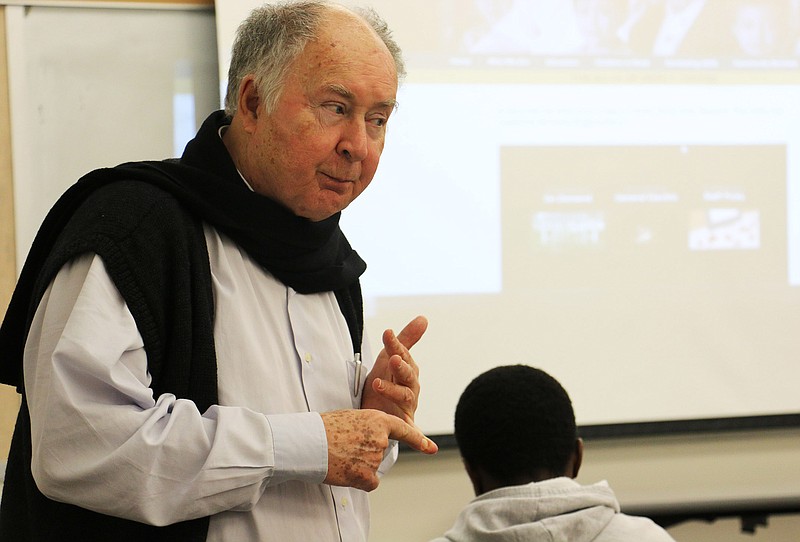Fr. Joe Maier, a priest who lives and works in the Klong Toey slums of Bangkok, said the Mercy Centre with which he works has educated a lot of children.
He described working with the poor as a great privilege.
"Do you get discouraged? Yes. Do you get tired? Yes. Do you want to run away? Yes," Maier said.
Maier spoke and spent time with Westminster College students as part of the school's Global Leader in Residence program. International students from Ghana, Nigeria, China, the Philippines Thailand and other countries attended Maier's talk Tuesday night.
With the Global Leader in Residence program, Bob Hansen, Westminster director of counseling and health services, said Westminster wants to promote the idea that the world is flat and everything people do affects others. He said Global Leader in Residence not only brings a speaker to campus, but also allows time for the speaker to visit with students. Maier will stop by classes and be available to chat with students at lunchtime today.
During his talk Tuesday night, Maier discussed his work with the Mercy Centre. He has been in Bangkok and Asia for about 48 years. He served as a missionary priest and a parish priest before starting the Human Development Foundation-Mercy Centre with Sr. Maria Chantavarodom in 1973. He described Chantavarodom as the heartbeat of the Mercy Centre, which is home to about 180 children who have been abandoned, orphaned and trafficked.
"The highest honor in this world is that a child who has been molested and abused trusts you," Maier said.
According to the organization's website, about 40 of those 180 children have HIV/AIDS. The Mercy HIV/AIDS Community Home Care team works with children and adults. They also work with government institutions in Thailand, Laos and Burma. The foundation works closely with police on anti-trafficking. It also runs pre-schools in Bangkok that teach between 2,500 and 3,000 children every day.
He said religious ethics is necessary when doing the type of work the Mercy Centre does.
"If you're going to do these types of things, you must be a house of religion," Maier said Tuesday night.
When working with the children, Maier said the Mercy Centre doesn't approach its work as charity. He likened its relationships with the children it works with to that of a family.
"It's a business deal. This charity stuff doesn't work." Maier said. "It's like raising a family."
Unlike a charity mindset, a family mindset puts more responsibility on the children. He said, as an example, children need shoes to attend school. Rather than giving a child a pair of shoes so they can go to school, they loan the child shoes with the understanding that the child needs to attend school each day in exchange.
He said the Mercy Centre learns a lot from the children it works with.
"The real teachers are the children, not the adults," Maier said.
One Westminster student in attendance Tuesday night asked Maier what he has learned from children. Maier pointed to how children resolve conflict. He said one minute they are fighting and after resolving their differences, they are playing together five minutes later. He said to learn from the children, he simply listens.
"It's all little things. It's all tiny things," Maier said.
He encouraged the students in attendance Tuesday night to do little things and to pay it forward.

